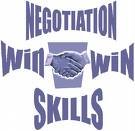There are some consequences of failed planning:
1. Negotiators fail to set clear objectives or targets that serve as benchmarks for evaluating offers and packages.
2. If negotiators have not done their homework, they may not understand the strengths and weaknesses of their won positions or recognize comparable strengths and weaknesses in the other party argument.
3. Negotiators cannot simply depend upon being quick and clever during give and take of negotiation.
The goals are focus that drives a negotiation strategy.
Direct effects of how goals affect negotiation are important to understand:
1. Wishes are not goals, especially in negotiation. Wishes may be related to interests or needs that motivate goals, but they are not goals themselves.
2. Goals are often linked to the other party’s goals.
3. There are boundaries or limits to what goals can be.
4. Effective goals must be concrete, specific, and measurable. The less concrete and measurable our goals are, the harder it is to (a) communicate to the party what we want (b) understand what the other party wants (c) determine whether an offer on the table satisfies our goals.
A negotiator who carefully plans will make an effort to do the following:
1. Understand the key issues that must be resolves in the upcoming negotiation
2. Assemble all the issues together and understand the complexity of the bargaining mix.
3. Understand and define the key interests at stake that underlie the issues
4. Define the limits- points where we will walk away- and alternatives other deals we could do if this deal does not work out.
5. Clarify the targets to be achieved and the opening points- where we will begin the discussion.
6. Understand constituents and what they expect of me
7. Other party in the negotiation- their goals, issues, strategies, interests, limits, alternatives, targets, openings, and authority.
8. Plan the process by which I will present sell my ideas to the other party
9. Define the important points of protocol in the process- the agenda, who will be at the table or observing the negotiation, where and when we will negotiate, and so on.
10. Understand the flow of negotiations: stages and phases:
Phase 1 Preparation
phase 2 Relationship building
phase 3 Information gathering
phase 4 Information using
phase 5 Bidding
phase 6 Closing the deal
phase 7 Implement the agreement
By Ivan and Vivian

No comments:
Post a Comment